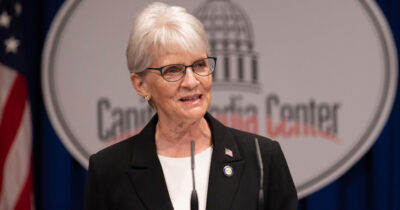Democrats in the Pennsylvania House and Senate unveiled legislation for a state-run cap-and-trade carbon credits system last week, one that critics say will drive up costs for ratepayers in the Keystone state.
“As a major energy-producing state, we have a responsibility to lead the way in addressing climate change,” said Sen. Carolyn Comitta (D-Chester). She’s the lead sponsor in the Senate of the Pennsylvania Climate Emissions Reduction Act (PACER).
Gov. Josh Shapiro proposed PACER in March as an alternative to the multi-state Regional Greenhouse Gas Initiative (RGGI) cap-and-trade system. An attempt by former Gov. Tom Wolf (D) to push Pennsylvania into RGGI over the heads of the GOP-controlled legislature has been blocked by the courts.
Shapiro portrayed PACER as necessary for the future of the Keystone State. “[Energy proposals] must meet the three-part test of protecting and creating energy jobs, taking real action to address climate change pollution, and ensuring reliable, affordable power for consumers in the long term,” said Shapiro on Thursday.
The governor promised that it would result in lower emissions, save consumers $252 million via electricity rebates over five years, and create 14,500 jobs.
Free market advocates scoffed at Shapiro’s PACER idea and called it a tax on consumers.
“PACER represents a massive new tax on power producers,” says the Commonwealth Foundation. “Data suggests the economic impact of PACER would be around $499 million in new taxes.”
Republicans in Harrisburg unveiled what they called a pro-energy agenda shortly after Shapiro’s PACER proposal was announced. The legislative package included proposals that turned more than $520 billion in Act 129 funds into a credit on energy bills. Other proposals would create an Independent Energy Advocate within the Department of Environmental Protection (DEP) and a new agency to promote energy development.
A spokesperson for House Republican Leader Bryan Cutler told DVJournal that helping consumers needed to be at the forefront of any energy legislation. “The package, taken as a whole, will not only provide that direct help to consumers, but also recognizes the attitude at the state level must change to increase energy development and focus on lowering costs on Pennsylvanians.”
Pennsylvania is second in the nation in natural gas production, and a 2023 study revealed the industry contributed $41 billion to the state economy, along with 123,000 jobs.
PJM Interconnection, the operator of Pennsylvania’s power grid, said last month its emissions plummeted 43 percent from 2005 to 2023. Power demand increased during the same time period.
But for green activists, like state Rep. Danielle Friel Otten (D-Chester), that’s not enough.
“We are at a point where inaction on climate is not an option,” she said Thursday. “Only 4 percent of Pennsylvania’s energy comes from renewable sources, and we are ranked 45th in the country for the amount of clean energy that’s used to power our homes and businesses.”
Power grid operators and energy advocates feel otherwise.
PJM warned earlier this year Pennsylvania and other states could face blackouts by 2028 if coal and natural gas plants continue to be shut down at a rapid pace. Rural areas would be the most vulnerable.
“Renewable energy is not reliable,” Sen. Gene Yaw (R-Bradford) told DVJournal. “It’s intermittent and of limited duration. If we don’t get control over it, we are going to suffer blackouts. It’s inevitable.”
Yaw did not expect any sort of grand bargain between the Republican-held Senate and the Democrat-held House and governor’s mansion. “I don’t have a good feeling about it.”
The Senate has already passed several energy pieces. That included the creation of an Independent Energy Office. Yaw said the office would provide impartial, data-drive analysts to help the state meet future energy needs.
A Shapiro spokesperson told DVJournal the governor does not support the bill but is glad the GOP wants to work with Democrats.
Pennsylvania Coal Alliance Rachel Gleason criticized the PACER announcement. She told DVJournal Shapiro ignored the advice of his RGGI Working Group that only recommended a carbon cap-and-tax policy.
“This plan clearly puts Pennsylvania residents, its businesses and the economy at a disadvantage by forcing the premature closure of reliable baseload generation and mandating subsidies for unproven and unreliable technologies,” she said.

